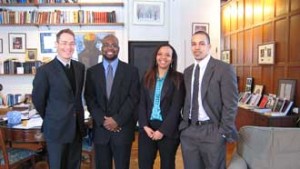
Presidency will bring annual conference to Montreal
By Pascal Zamprelli
Though his parents always stressed the importance of a good education, Anthony Morgan tended to get into lots of trouble in school. But in his last year of high school, he became drawn to issues of justice, and began reading about how African-American leaders in the United States used knowledge of the law to help protect their communities. “So I turned it around,” he said, “and I fell in love with law in Grade 12 [in Brampton, Ont.].”
Morgan’s new passion would eventually lead him to McGill’s Faculty of Law, where he is completing his first year, and to involvement with the Black Law Students Association of Canada (BLSAC), an organization which has, over its 18-year existence, been dedicated to promoting diversity within the legal profession and serving the African Canadian community and Canadian society as a whole.
At its recent annual conference, Morgan was elected president of the association. What’s more, he’ll be joined on the executive by some familiar faces. In a rare occurrence, two other McGillians were elected: Cynthia Burton will serve as the organization’s Francophone Representative, while Laurent Koné assumes the role of Vice-President for the Province of Quebec.
“BLSAC is essentially there to represent the interests of black law students across Canada,” Morgan said. “Our aim is also to engage issues that affect the black community.” The association supports academic, professional and networking opportunities for black law students and provides mentoring for high school and university students interested in a legal career. As president, Morgan must consider the objectives and mandate of the organization “and develop a vision for the year around that.”
This vision includes plans to reach out in an effort to both enhance the networks of black law students and lawyers in Canada, and also build coalitions with other groups having similar mandates, such as those representing other traditionally underprivileged groups. “We have been and want to continue concentrating on doing what we can with aboriginal communities, women’s rights groups, gay/lesbian groups,” he said.
He also sees value in building bridges beyond the legal profession and partnering with black students in other disciplines. He envisions, for example, engaging medical students in a discussion on private health care, or engineering students in talks about intellectual property rights, to determine how these issues affect the African-Canadian community.
As is tradition, BLSAC’s annual conference will be held on the president’s turf, which means that in February of 2010 about 200 students, academics, and legal professionals will convene at McGill to hear guest speakers, discuss issues in law affecting their community, and recognize African-Canadian achievements in law. Morgan also hopes to broach the topic of legal education from minority perspectives, drawing on both the legal network he plans to enhance, and the new networks he plans to forge. He believes such conversations among minority groups may lead to substantive changes from which law schools, and all their students, could benefit.
To this conference preparation and coalition-building, add Morgan’s plans for programs in career development and high school and undergraduate outreach, and it’s clear he is looking at a busy year. But then, the passion has been there since high school, and now that he’s reached his goal of getting to law school, he seems eager to make the most of it. “We’re in this space,” he said, “and it is frankly a privileged space to be in. It’s especially important as black people because we find ourselves in these spaces so rarely. We need to do what we can to be more accessible, more visible, and more useful to our community in whatever ways we possibly can.”
